By Inés San Martín, Special to the Tablet
YANGON, Myanmar – At a distance, it’s easy to judge Pope Francis’ visit to Myanmar, the first by a pope to this overwhelmingly Buddhist nation, in absolutes – will he or won’t he publicly acknowledge the plight of the Rohingya, for instance, or will his presence push the nation in the direction of greater democracy and peace, or won’t it?
On the ground here, however, the trip is being seen through a wide scale of grays, with differing takes on it all – including how much sympathy the largely Muslim Rohingya actually deserve, how flawed the government of Nobel Laureate Aung San Suu Kyi really is, and how much is realistic to expect from a three-day visit by the pope.
Things began Monday on a high note, despite the fact that the pope was originally scheduled for a free afternoon after an 11-hour overnight flight. Following the advice of the head of the Myanmar Church, he met in private with Gen. Min Aung Hlaing, head of the country’s military, and other military officers.
For over six decades beginning in 1962, the country, formerly known as Burma, was ruled by the army. Two years ago, democratic elections were held and Suu Kyi was appointed state counselor. However, the army continues to control the borders, as well as the powerful Ministries of Defense and Home Affairs.
The pope met with the general at the express request of Cardinal Charles Muang Bo of Yangon, who said that if the Pope didn’t do so, the army leadership could feel slighted and the fallout could be felt across the country, and perhaps especially by the tiny Christian minority.
Many in the international community have criticized Suu Kyi, claiming she has remained silent about what the United Nations has declared a “textbook ethnic cleansing” directed against the Rohingya, and perpetrated by the military on her watch.
Yet many locals, from Cardinal Bo to airport personnel who were on hand as Pope Francis was coming off the plane in Yangon’s airport, said that whatever Suu Kyi’s flaws, she’s the best hope the country has to continue its transition to democracy. Everyone is quick to highlight that her government isn’t perfect, but they’re equally emphatic that the alternative would be worse.
Cardinal Bo himself has come under fire in some quarters for becoming what some have described as the “messenger man” of Myanmar’s government. However, the view differs on the ground.
“His eminence has been perhaps the only national level leader who has consistently and courageously spoken out for the Rohingya,” said a priest close to the organization of Pope Francis’ visit. For instance, last year Cardinal Bo was invited to address the British parliament, and in his speech he used the very term, “Rohingya,” he’s asked Pope Francis not to use while he’s in the country.
Back in 2016, the cardinal called for an independent, international investigation, describing the suffering of the Rohingya as “an appalling scar on the conscience of my nation.”
He went on to describe them as one of the “most marginalized, dehumanized, and persecuted people in the world …. They are treated worse than animals. Stripped of their citizenship, rejected by neighboring countries, they are rendered stateless. No human being deserves to be treated this way.”
An expert close to the local Church, who requested to remain anonymous out of concern for their safety, told The Tablet it’s easy to judge what Cardinal Bo is doing and saying “from the comfort of the West.”
Difficult Political Situation
The context underlying that statement includes the fact that the country’s 2008 constitution, drafted by the military, stipulates that the armed forces can retake power if the country is “in crisis.”
A weakened Suu Kyi, some locals say, might be the only pretext the army needs to justify another takeover, and in their eyes, criticism of her handling of the Rohingya situation actually undercuts the push for democracy, rather than serving it.
Some in Myanmar – given to theories virtually impossible to verify – also believe China would like to see a return to military rule, since they need the country for an oil pipeline that would allow the Asian giant to create a shortcut for crude oil from the Middle East to China, rather than being shipped southwards and passing through Singapore. If the regime in Myanmar that has to sign the deal is free from democratic pressures, these cynics say, the Chinese would like it all the better.
During a visit journalists traveling with the pope paid to the Shwedagon Pagoda, the country’s most important Buddhist temple, a 19-year old monk by the name of Naing Win said that he finds Pope Francis to be a “very interesting figure,” and confessed to having hopes of meeting the pontiff while he’s here.
The monk said that, above all, he hopes Pope Francis can bring peace to the country.
It would be easy to presume that he was talking about what’s happening in Rakhine State, the original home of the 600,000 Rohingya who have fled to Bangladesh, since that’s where international attention is today.
However, the monk has little compassion for what’s going on there. He acknowledges that the military has abused its power over the people the government doesn’t even acknowledge as citizens. Yet asked if perhaps it’s time to grant the Rohingya citizenship status, he took some time to think, and then said simply, “No.”
Together with many of the 500,000 Buddhists monks in the country, on this issue Win is aligned with a hard-line, monk-led Buddhist nationalist group known as Ma Ba Tha – the “Association for the Protection of Race and Religion.”
Win is convinced that if left to their own devices, Muslims will continue to grow in number and change Myanmar’s demographics. He’s not alone. At least three of the 10 people consulted in the past two days believe the Rohingya’s long-term goal is to have their own, independent country where they can apply Islamic Sharia law.
“And then they’ll kill us here as they’ve killed us in Syria and Iraq,” one local priest told The Tablet.
Many experts on Myanmar say that decades of military rule have left many in the country with a deeply ingrained nationalism, xenophobia and anti-Islamic bias. Win, the Buddhist monk, puts things more simply.
“We love everyone, of all ethnic backgrounds and religions, but not terrorists,” he said.
Nay Chi Win is a lay Buddhist who worked for Suu Kyi’s party for decades. Even though he’s found flaws in what her government has achieved so far, he believes she’s the best option for the country. Like Naing Win, he believes the pope’s visit can bring peace to Myanmar.
Asked to explain what he means, he spoke about Myanmar’s many conflicts over the past decades based on ethnic or religious differences. He chose to focus on the case of Kachin State, the country’s northernmost state, on the border with China.
With the unilateral abrogation of the “Union of Burma” constitution by the military regime in 1962, Kachin forces formed the Kachin Independence Army. Since then, conflict has been cyclical, with a cease fire signed in 1994 and broken by the military in 2011. Hundreds of thousands still live as internally displaced persons after that violent outbreak.
Yet there are also cases of ethnic violence in the northern Shan states, as well as in the southeastern states and regions such as Karen, Kayah and Tanintharyi. Arguably, all of these, and not only the Rohingya drama, were in Pope Francis’ thoughts when he told the people of Myanmar that he wanted to go to the country.
Nay Chi Win would like to see the pope’s visit helping to achieve the definitive end to all these conflicts, and also wants to see the pontiff urging the people of Myanmar to find ways to gather around shared ideas and principles instead of being divided over the differences.
But even in this hopeful sentiment of what the papal visit can bring, not everyone sees it the same way. A businessman from Rakhine State, who requested to be identified only as “Bo,” said, “Not even a visit by God himself can save this country.”
It remains to be seen what Pope Francis achieves during the three days he spends here in Myanmar. One thing, however, seems certain: Whatever the outcome seems to be on the surface, the reality will be much more complicated.
Cautious Choice of Words
The plight of the ethnic Muslim minority in Myanmar’s Rakhine state was front and center in speeches by Pope Francis and Aung San Suu Kyi, but neither publicly used the word Rohingya.
After private meetings Nov. 28 with Myanmarese President Htin Kyaw and Suu Kyi, the state counselor and de facto head of government, the pope and Suu Kyi gave formal speeches to government officials and diplomats gathered at the convention center in Naypyitaw, the nation’s capital.
Suu Kyi, leader of the process to bring democracy to Myanmar and winner of the 1991 Nobel Peace Prize, publicly acknowledged, “Of the many challenges that our government has been facing, the situation in Rakhine has most strongly captured the attention of the world.
“As we address long-standing issues – social, economic and political – that have eroded trust and understanding, harmony and cooperation between different communities in Rakhine, the support of our people and of good friends who only wish to see us succeed in our endeavors has been invaluable.”
Road to Peace Not Smooth
“The road to peace is not always smooth,” she told the pope, “but it is the only way that will lead our people to their dream of a just and prosperous land that will be their refuge, their pride, their joy.”
In his speech, Pope Francis was even less specific, although he repeatedly insisted that the rights of each member of society and each ethnic group must be respected.
He praised the role of the United Nations and the international community in supporting peace efforts, presumably also in their condemnations of the discrimination and persecution of the Rohingya, a Muslim minority.
“The future of Myanmar must be peace, a peace based on respect for the dignity and rights of each member of society, respect for each ethnic group and its identity, respect for the rule of law, and respect for a democratic order that enables each individual and every group – none excluded – to offer its legitimate contribution to the common good,” Pope Francis said.
The pope said he wanted to visit the country to strengthen the small Catholic community and “to offer a word of encouragement to all those who are working to build a just, reconciled and inclusive social order.”
Myanmar’s “greatest treasure,” he insisted, “is its people, who have suffered greatly, and continue to suffer, from civil conflict and hostilities that have lasted all too long and created deep divisions.”
Pope Francis praised Suu Kyi for convoking the “21st Century Panglong Union Peace Conference,” a series of meetings that began in 2016 between the government and militant groups from more than a dozen ethnic groups in Myanmar.
The Rohingya are not included in the peace process since the government does not consider them to be a Myanmar ethnic group, but rather foreigners.
Religious communities must play a role in the process of reconciliation and integration, the pope said.
“Religious differences need not be a source of division and distrust, but rather a force for unity, forgiveness, tolerance and wise nation building.”
In addition to helping heal “the emotional, spiritual and psychological wounds of those who have suffered in the years of conflict,” he said that all religions “can help to uproot the causes of conflict, build bridges of dialogue, seek justice and be a prophetic voice for all who suffer.”
When Pope Francis arrived in Yangon, Nov. 27 for his four-day visit, he was greeted by two dozen children wearing traditional attire and by the nation’s bishops.
Contributing to this coverage is Cindy Wooden of Catholic News Service.

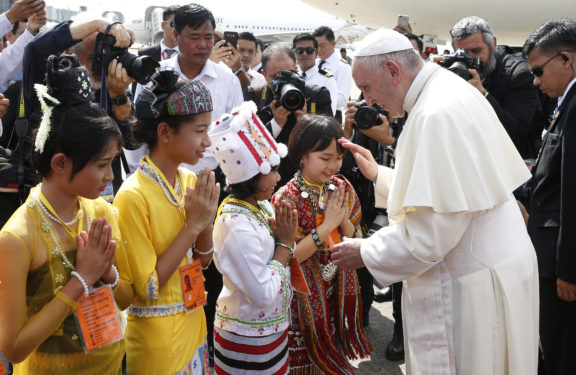
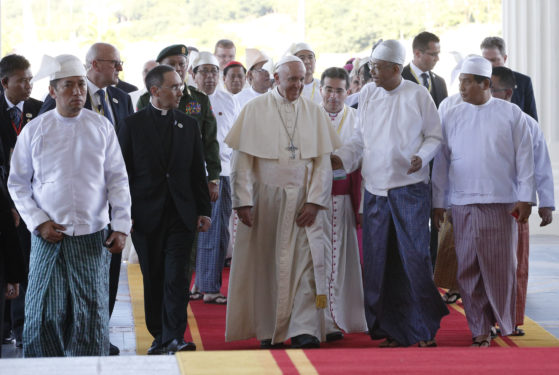
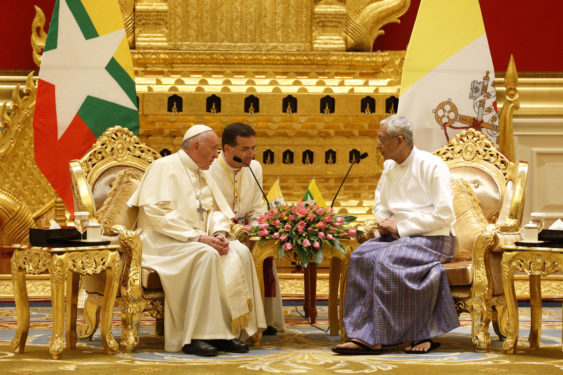
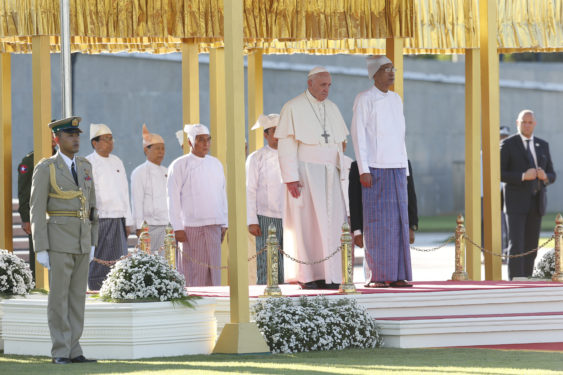
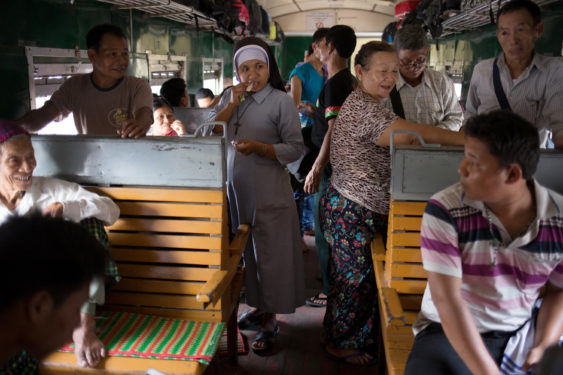
May Myanmar be blessed with peace, solidarity, and security.